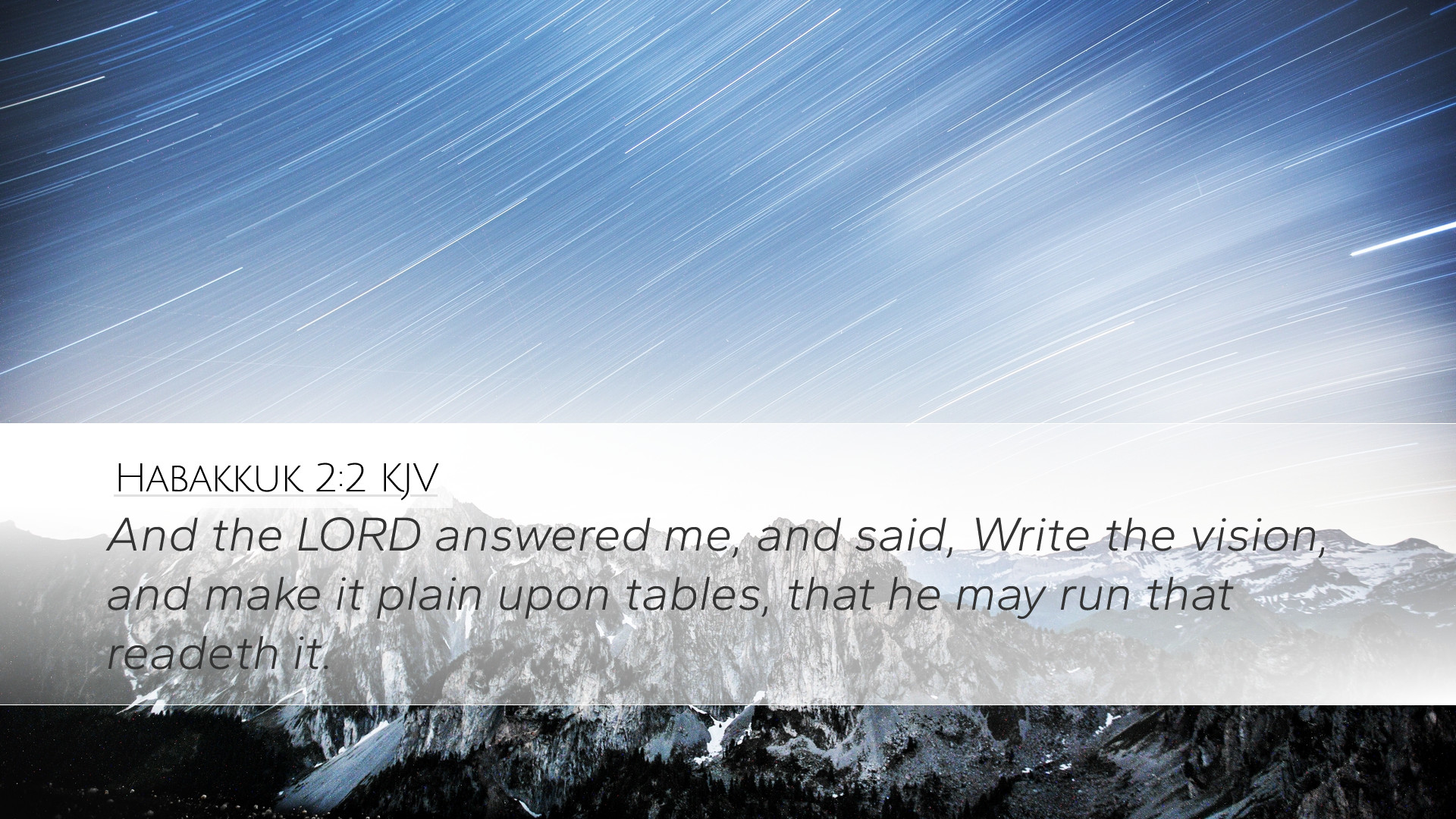Old Testament
Genesis Exodus Leviticus Numbers Deuteronomy Joshua Judges Ruth 1 Samuel 2 Samuel 1 Kings 2 Kings 1 Chronicles 2 Chronicles Ezra Nehemiah Esther Job Psalms Proverbs Ecclesiastes Song of Solomon Isaiah Jeremiah Lamentations Ezekiel Daniel Hosea Joel Amos Obadiah Jonah Micah Nahum Habakkuk Zephaniah Haggai Zechariah MalachiHabakkuk 2:2
Habakkuk 2:2 KJV
And the LORD answered me, and said, Write the vision, and make it plain upon tables, that he may run that readeth it.
Habakkuk 2:2 Bible Commentary
Commentary on Habakkuk 2:2
Habakkuk 2:2 states: "And the LORD answered me, and said, Write the vision, and make it plain upon tables, that he may run that readeth it." This verse is a seminal text that speaks to the importance of divine revelation and the clarity with which it should be communicated. The insights from various public domain commentaries, such as those by Matthew Henry, Albert Barnes, and Adam Clarke, reveal layers of meaning and application suitable for pastors, students, theologians, and Bible scholars.
Understanding the Context
The book of Habakkuk is a unique prophetic work wherein the prophet engages in dialogue with God concerning the justice and perceived inactivity of God in the face of injustice. This verse comes at a critical moment, where God instructs Habakkuk to record His answer, thus emphasizing the seriousness with which divine messages should be taken. The historical backdrop of imminent calamity and the rising Babylonian threat accentuates the urgency of this divine communication.
Key Commentary Insights
-
Matthew Henry's Commentary:
Henry highlights the significance of writing the vision, noting that it is not merely a mundane task but an act of obedience and worship. He emphasizes that the prophetic vision is meant for guidance and should be articulated in a manner that is accessible and clear to all who encounter it. The phrase "make it plain" indicates the intention for the message to be widely understood, so those who "run" may do so with purpose and direction.
-
Albert Barnes' Commentary:
Barnes focuses on the imperative to "write the vision," illustrating that recording God's message serves as a lasting testament to His promises and purposes. He elaborates that the act of writing ensures the preservation and dissemination of God’s instructions, making it possible for future generations to access divine wisdom. The act of running implies urgency in responding to God's word, reflecting a call to action for believers.
-
Adam Clarke's Commentary:
Clarke provides an analysis of the practical implications of this verse, noting that the clarity of the vision allows for its application in community life. He suggests that leaders and messengers must strive to communicate God’s word effectively, enabling others to understand and act upon it. Clarke also points to the metaphor of 'running' as indicative of both the immediate dissemination of the vision and the personal response to God's directives.
Thematic Elements
This verse encapsulates several key themes relevant to the contemporary church and individual believers:
-
Revelation and Communication:
God speaks to His people, and in Habakkuk's case, He commands clarity. The task of relaying God’s vision is both a privilege and a responsibility. This elevates the importance of sound theological teaching within the church context.
-
Urgency of Response:
The encouragement to "run" signifies a dynamic and active faith. It calls believers to not only receive the word but to engage with it passionately, urging a lifestyle that reflects the principles of the divine message.
-
Community in Action:
The act of writing and making the vision plain serves the community. Habakkuk’s message is not just for the prophet but is intended for all who will read it, implying that the faithful transmission of God's word fosters communal strength and understanding.
-
Inspiration for Leaders:
Leaders are reminded of the duty to communicate clearly and effectively. This verse serves as a call to those in ministry to ensure their messages are grounded in Scripture and communicated in a manner that is approachable to their congregation.
Practical Applications
For contemporary believers and leaders, there are significant applications of Habakkuk 2:2:
-
Scriptural Literacy:
Encourage the consistent study of Scripture to deepen understanding and recognize God’s communication in the present day.
-
Effective Teaching:
Pastors and teachers are spurred to convey biblical truths in their simplest forms, ensuring accessibility for all parishioners.
-
Evangelism and Discipleship:
As readers absorb the vision, they are motivated to take action—sharing their insights and experiences with others in their circles, fostering a culture of evangelism.
-
Personal Reflection:
Believers are urged to reflect on their own responsiveness to God’s teachings. Are they merely hearing the word, or are they actively running with it?
Conclusion
In conclusion, Habakkuk 2:2 is a powerful exhortation by God that transcends its original context, extending into all facets of faith practice today. The commentaries by Henry, Barnes, and Clarke provide rich insights that highlight the importance of divine communication, the urgency of faithful response, and the role of clarity in sharing God’s vision. This verse challenges modern believers and leaders alike to commit themselves to understanding, embracing, and actively living out the revelations granted to them. As they do, they partake in the noble task of running with the vision and ensuring that the message of God is made plain for all to see.


